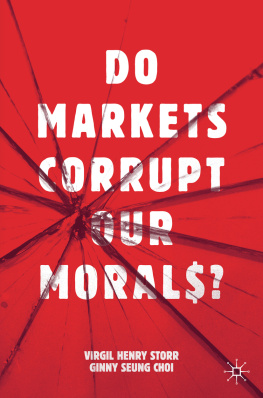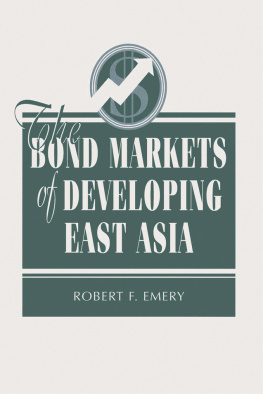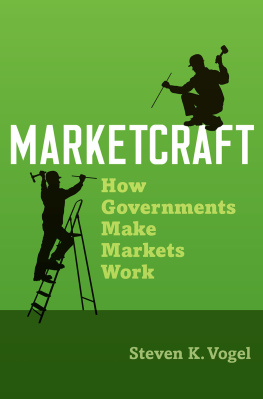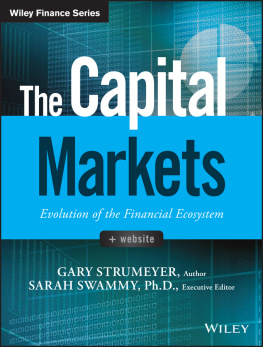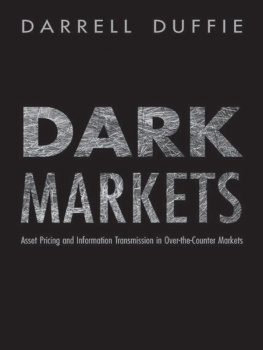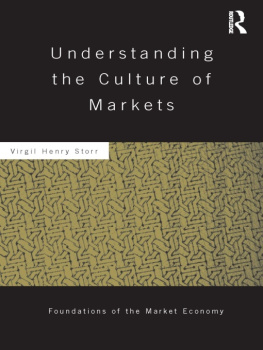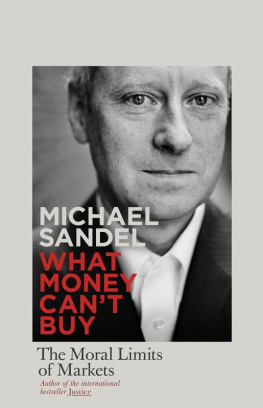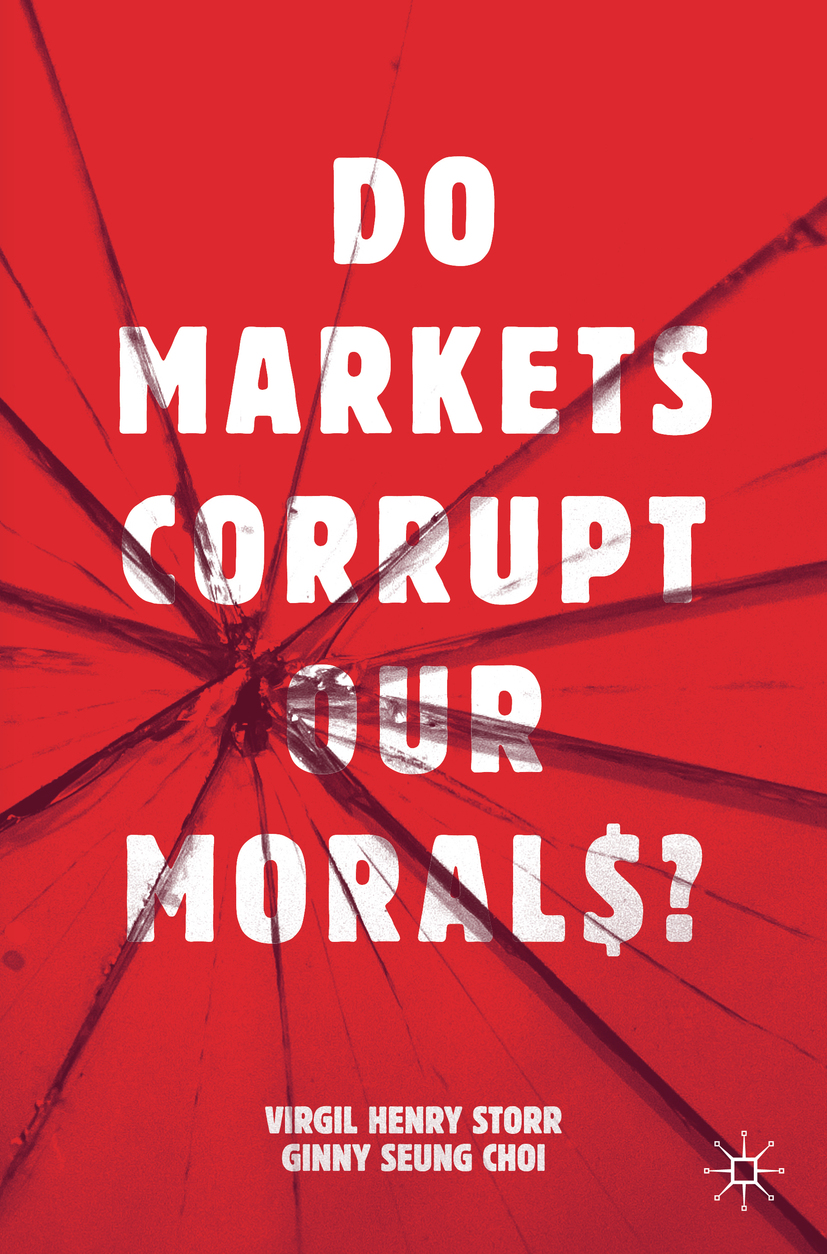Virgil Henry Storr and Ginny Seung Choi
Do Markets Corrupt Our Morals?
Virgil Henry Storr
Department of Economics, George Mason University, Fairfax, VA, USA
Ginny Seung Choi
The Mercatus Center at George Mason University, Arlington, VA, USA
ISBN 978-3-030-18415-5 e-ISBN 978-3-030-18416-2
https://doi.org/10.1007/978-3-030-18416-2
The Editor(s) (if applicable) and The Author(s) 2019
This work is subject to copyright. All rights are solely and exclusively licensed by the Publisher, whether the whole or part of the material is concerned, specifically the rights of translation, reprinting, reuse of illustrations, recitation, broadcasting, reproduction on microfilms or in any other physical way, and transmission or information storage and retrieval, electronic adaptation, computer software, or by similar or dissimilar methodology now known or hereafter developed.
The use of general descriptive names, registered names, trademarks, service marks, etc. in this publication does not imply, even in the absence of a specific statement, that such names are exempt from the relevant protective laws and regulations and therefore free for general use.
The publisher, the authors and the editors are safe to assume that the advice and information in this book are believed to be true and accurate at the date of publication. Neither the publisher nor the authors or the editors give a warranty, express or implied, with respect to the material contained herein or for any errors or omissions that may have been made. The publisher remains neutral with regard to jurisdictional claims in published maps and institutional affiliations.
Cover illustration: Friedhelm Steinem-Broo
This Palgrave Macmillan imprint is published by the registered company Springer Nature Switzerland AG
The registered company address is: Gewerbestrasse 11, 6330 Cham, Switzerland
Storr and Choi ask: Do markets corrupt our morals? Their answer supports two propositions: (1) If there is no morality there can be no markets; (2) Markets enable liberalism and people to flourish.
Vernon L. Smith, Professor of Economics and Law, Chapman University; 2002 Nobel Laureate in Economics
Even self-proclaimed socialists grudgingly concede that economic markets are productive. However, they set participants against each other, rely entirely on self-interest rather than community, reward greed, and generally elevate money over virtue. About the best that can be said for them is that they can serve as the cash cow allowing massive redistribution.
If this is the common wisdom, then Storr and Choi offer an uncommon corrective. They argue along several pathways that markets buttress virtue, promote sociability, bring out the brighter lights of our nature. That is, economic society isnt just instrumentally worth holding on to but makes us better people. With carefully curated evidence and lucid explanation, Do Markets Corrupt Our Morals? demonstrates that neither economic society nor economics deserves its reputation as dismal.
Loren E. Lomasky, Cory Professor of Political Philosophy, Policy & Law, University of Virginia; author of Persons, Rights and the Moral Community
The collapse of Lehman Brothers in 2008 was a catastrophe in itself, and a symptom of something bigger. We came to see our financial markets as an orgy of greed. But why 2008? It is not as if that was the year when greed was invented. So, what transformed an omnipresent germ of greed into 2008s flesh-eating superbug? What new policy goals and new financial instruments taught people to think that the aim of investing is to get rich quick rather than to build a long-term portfolio of cautiously balanced risk? Storr and Choi understand that 2008 was not humanitys first crisis; neither will it be the last. But why do some economies recover, while chaos and poverty seem endemic in other economies? What establishes and sustains the moral foundations of thriving market societies?
David Schmidtz, Kendrick Professor of Philosophy, University of Arizona; author of The Elements on Justice
Virgil Storr and Ginny Choi jump with both feet into a centuries old debate on whether the market economy while delivering us material progress does so at the cost of corrupting our moral sense. Do Markets Corrupt Our Morals? sets out to weigh the various sides of the arguments and in this carefully reasoned book they bring conceptual clarity and empirical analysis to a topic too often marred by conceptual confusion and empirical vacuousness. It is an engaging read from start to finish, and a work vitally needed for our times. Storr and Choi have produced a must-read book for scholars across the social sciences and the humanities and provide us with the necessary starting point for a productive conversation on markets and morality.
Peter J. Boettke, University Professor of Economics and Philosophy, George Mason University; author of Living Economics: Yesterday, Today, and Tomorrow
This is a lively, original and timely book. Turning the standard arguments against markets on their head, Storr and Choi stress the educational function of markets. Where democracy relies upon the idea of ruling and being ruled in turn, markets encourage the ideal of serving others and being served in turn. Markets thus are mutually beneficial not only in a material sense. Markets are also morally mutually beneficial, encouraging virtue on the part of individuals and strengthening cooperative bonds across communities as a whole. This is a deeply humane study of markets. May it be widely read!
John Tomasi, Romeo Elton Professor of Natural Philosophy, Brown University; author of Free Market Fairness
The common sentiment regarding markets is that they bring out the worst in people by rewarding and reinforcing selfish if not corrupt behavior. As Storr and Choi argue in this insightful, important, and timely book, not only does the market coexist with morality, it actively promotes it, supporting and enhancing our participation in our communities and creating a more prosperous society in terms of virtue as well as wealth.
Mark D. White, Chair of the Department of Philosophy, College of Staten Island/CUNY; editor The Oxford Handbook of Ethics and Economics
Storr and Choi have brought economics and politics back to ethics, which should never have been left. Of course values matter. Of course markets smooth off the rough sides of humans. Of course sweet commerce reigns, and should. Of course. But it took a brilliant book like this one to show it.
Deirdre N. McCloskey, author of The Bourgeois Virtues: Ethics for an Age of Commerce
Preface and Acknowledgments
On September 15, 2008, Lehman Brothers filed for bankruptcy protection. Although people who paid attention to these kinds of things were aware that something was wrong with global financial markets long before Lehman collapsed, it became clear on that day to even the casual observer (and became even more apparent in the weeks and months that followed) that markets simply were not working as they had worked in the past. There was a global financial crisis underway. This was followed by the Great Recession. In countries around the world, wealth seemed to evaporate overnight, incomes fell dramatically, and unemployment rose precipitously. While there is still some debate over what caused the crisis and the recession that followed, many people have singled out acquisitiveness as one of the chief culprits. That the market system seemed to have encouraged consumers (especially home buyers) to want more than they could afford and seemed to have encouraged businesses (especially financial firms) to put profits over principles appeared to be key reasons behind the global downturn. For many, the economic downtown, and the greed that seemed to be behind it, proved that there was just something wrong with the market system.

